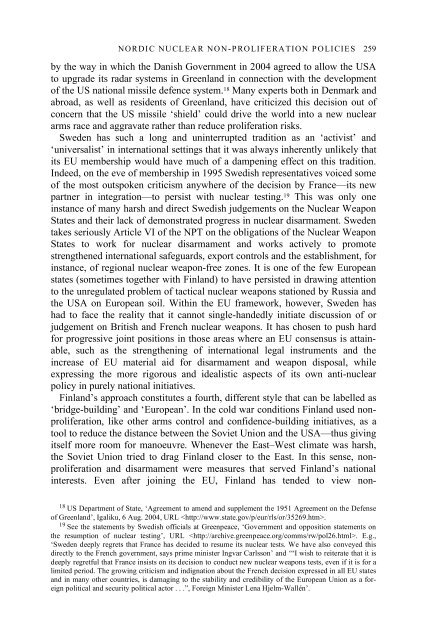14. Nordic nuclear non-proliferation policies - Publications - SIPRI
14. Nordic nuclear non-proliferation policies - Publications - SIPRI
14. Nordic nuclear non-proliferation policies - Publications - SIPRI
You also want an ePaper? Increase the reach of your titles
YUMPU automatically turns print PDFs into web optimized ePapers that Google loves.
NORDIC NUCLEAR NON-PROLIFERATION POLICIES 259<br />
by the way in which the Danish Government in 2004 agreed to allow the USA<br />
to upgrade its radar systems in Greenland in connection with the development<br />
of the US national missile defence system. 18 Many experts both in Denmark and<br />
abroad, as well as residents of Greenland, have criticized this decision out of<br />
concern that the US missile ‘shield’ could drive the world into a new <strong>nuclear</strong><br />
arms race and aggravate rather than reduce <strong>proliferation</strong> risks.<br />
Sweden has such a long and uninterrupted tradition as an ‘activist’ and<br />
‘universalist’ in international settings that it was always inherently unlikely that<br />
its EU membership would have much of a dampening effect on this tradition.<br />
Indeed, on the eve of membership in 1995 Swedish representatives voiced some<br />
of the most outspoken criticism anywhere of the decision by France—its new<br />
partner in integration—to persist with <strong>nuclear</strong> testing. 19 This was only one<br />
instance of many harsh and direct Swedish judgements on the Nuclear Weapon<br />
States and their lack of demonstrated progress in <strong>nuclear</strong> disarmament. Sweden<br />
takes seriously Article VI of the NPT on the obligations of the Nuclear Weapon<br />
States to work for <strong>nuclear</strong> disarmament and works actively to promote<br />
strengthened international safeguards, export controls and the establishment, for<br />
instance, of regional <strong>nuclear</strong> weapon-free zones. It is one of the few European<br />
states (sometimes together with Finland) to have persisted in drawing attention<br />
to the unregulated problem of tactical <strong>nuclear</strong> weapons stationed by Russia and<br />
the USA on European soil. Within the EU framework, however, Sweden has<br />
had to face the reality that it cannot single-handedly initiate discussion of or<br />
judgement on British and French <strong>nuclear</strong> weapons. It has chosen to push hard<br />
for progressive joint positions in those areas where an EU consensus is attainable,<br />
such as the strengthening of international legal instruments and the<br />
increase of EU material aid for disarmament and weapon disposal, while<br />
expressing the more rigorous and idealistic aspects of its own anti-<strong>nuclear</strong><br />
policy in purely national initiatives.<br />
Finland’s approach constitutes a fourth, different style that can be labelled as<br />
‘bridge-building’ and ‘European’. In the cold war conditions Finland used <strong>non</strong><strong>proliferation</strong>,<br />
like other arms control and confidence-building initiatives, as a<br />
tool to reduce the distance between the Soviet Union and the USA—thus giving<br />
itself more room for manoeuvre. Whenever the East–West climate was harsh,<br />
the Soviet Union tried to drag Finland closer to the East. In this sense, <strong>non</strong><strong>proliferation</strong><br />
and disarmament were measures that served Finland’s national<br />
interests. Even after joining the EU, Finland has tended to view <strong>non</strong>-<br />
18 US Department of State, ‘Agreement to amend and supplement the 1951 Agreement on the Defense<br />
of Greenland’, Igaliku, 6 Aug. 2004, URL .<br />
19 See the statements by Swedish officials at Greenpeace, ‘Government and opposition statements on<br />
the resumption of <strong>nuclear</strong> testing’, URL . E.g.,<br />
‘Sweden deeply regrets that France has decided to resume its <strong>nuclear</strong> tests. We have also conveyed this<br />
directly to the French government, says prime minister Ingvar Carlsson’ and ‘“I wish to reiterate that it is<br />
deeply regretful that France insists on its decision to conduct new <strong>nuclear</strong> weapons tests, even if it is for a<br />
limited period. The growing criticism and indignation about the French decision expressed in all EU states<br />
and in many other countries, is damaging to the stability and credibility of the European Union as a foreign<br />
political and security political actor . . .”, Foreign Minister Lena Hjelm-Wallén’.
















